Movie Review: 'The United States vs Billie Holiday
The government tried to destroy Billie Holiday as a warning to others about speaking out. It backfired. Eventually.
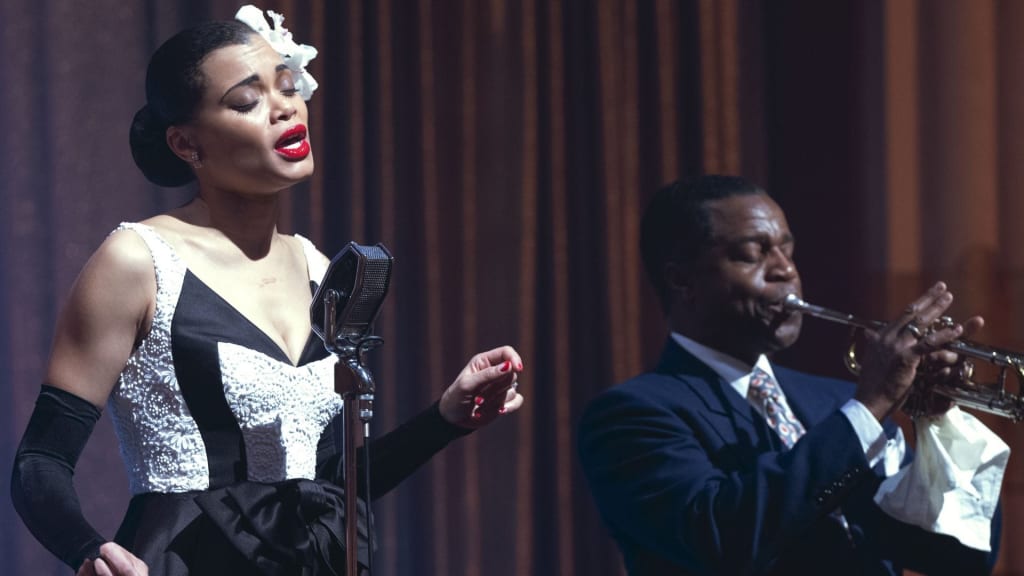
I don’t wish to psychoanalyze the power structure of an entire country or an entire gender of people, but, it appears from the evidence at hand, throughout American history, that racism is based deeply within the power desired by white men. Is it that white men hate black people just for being black? In some cases, perhaps, but the majority of racism and acting on racist instincts appears, to my amateur psychologist mind, to be an exertion of power over others. The desire to bend others to your will and not have to answer for it is one that has afflicted American history for decades.
A strong example of my thesis comes in the story of legendary singer, Billie Holiday. Holiday was among the most popular and charismatic performers of her day. She held audiences of white and black people at rapt attention with her remarkable gifts. She was also a woman troubled by a difficult upbringing and dealing with the stress that comes with fame by turning to heroin. Addiction became a refuge especially after the federal government turned its eyes to Holiday with a notion of exerting power over someone that appeared not under their control.

Director Lee Daniels brilliantly captures this in his new to Hulu biographical film, The United States vs Billie Holiday. Starring Andra Day in the title role of Holiday, the film examines why the government targeted Holiday and what they hoped to get out of constantly harassing one of the most successful and beloved artists of the 20th century. While her race was a central issue, the real crux of why the government went for Holiday was power and trying to control someone who was out of their control.
J. Edgar Hoover had a label he used to refer to any black person who gained influence or power, he called them ‘The Black Messiah.’ He frequently talked about stopping the rise of a black messiah, a man or woman of color who could wield the collective power of their race through their chosen medium. Whether it was entertainment or activism, stopping a Black Messiah was an obsession of Hoover and his racist minions.
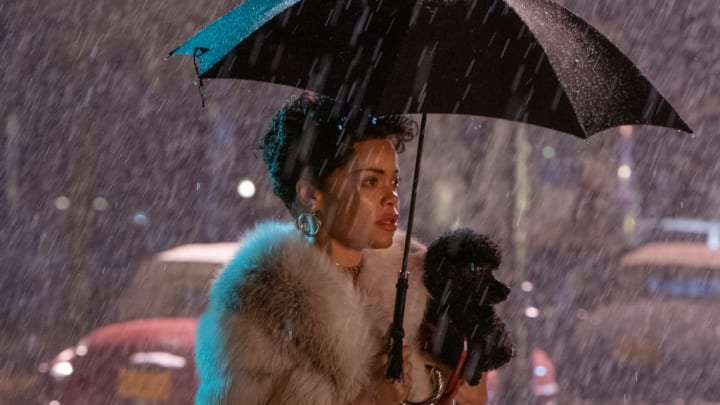
It’s easy to write this off as mere racism but digging to the core of the issue, these were white men who saw a target for their control fantasies and enacted upon these men and women their will in wielding power. Cops were the soldiers on the ground and they too had power fantasies and with people of color they had an unprotected class of people they could bully and bend to their will using violence that was not merely tolerated by those in power, it was actively encouraged. It was as if racism in general was feeding the power fantasies of white men as a collective.
Thus why, Billie Holiday was viewed as a threat to the power of the white power structure while also being a target who provided an immense challenge for those who wished to show how powerful they were by trying to control her. It started by pressuring Holiday not to sing her powerhouse anti-lynching anthem, Strange Fruit. It continued from there by having Holiday become the unwilling face of the early form of the war on drugs.
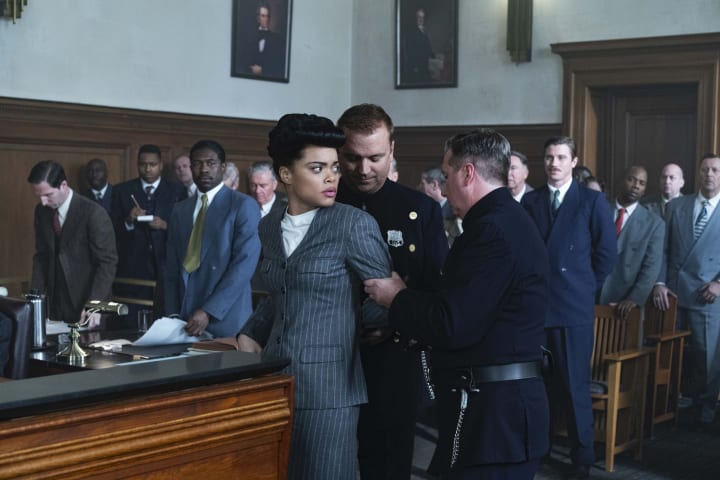
The government in the case of the movie, The United States vs Billie Holiday, takes the form of Harry J Anslinger, portrayed by Garret Hedlund. Anslinger was the head of what would become the D.E.A. Billie Holiday was his ticket to impressing Hoover, taking down one of those Black Messiah’s that Hoover talked about. With her willingness to speak truth to power via Strange Fruit, Holiday got onto the radar of the insecure white power structure who decided to make an example of her to show how powerful they believed they were.
Thus began a campaign of harassment and degradation that ended with Holiday being arrested on her deathbed, one final humiliation and a signal to others who might think they can defy the power of the government and the white men who created it. You can try to fool yourself into thinking that Holiday was a criminal who used illegal drugs, but ask yourself why, Harry Anslinger, the head of the future DEA, chose to be there when Holiday was arrested for the last time? He certainly didn’t show up for the arrest of any other drug addict in the country.
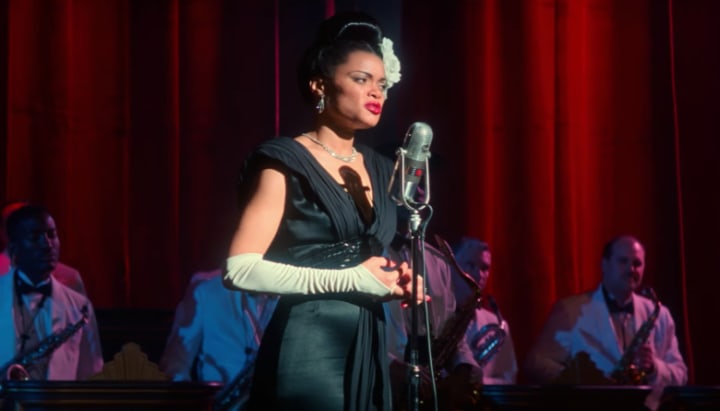
No, this was pointed and calculated. Anslinger could not break Holiday via his many agents and needed a power fix so badly that he had to be there to witness Holiday being humbled. That she refused to give him the satisfaction of confessing and naming the names of other addicts and those who supplied her, is one small, futile victory that Holiday took to her grave. This is only part of the story being told in The United States vs Billie Holiday but it’s the one that stood out to me.
Other incredible aspects of this remarkable, must see movie, include the story of Strange Fruit. History has failed to underscore just how brave and bold it was for Billie Holiday to stand before audiences, before the start of the Civil Rights movement, and sing about lynching. She was a revolutionary and while she was often terrified about singing the song and the trouble made for her by those trying to stop her, Holiday persisted. Her bravery in speaking truth to power is not talked about nearly enough and Lee Daniels should be commended for bringing this story back to the spotlight.
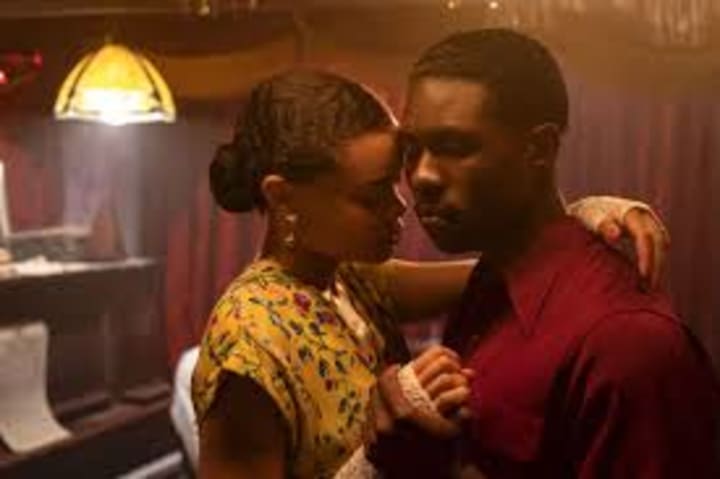
The United States vs Billie Holiday also captures the sexual allure of Billie Holiday in bold fashion. Star Andra Day is captivating in how she portrays the seductive beauty of Holiday the performer and the woman. Holiday stoked the desires of men and women alike and quietly became an icon of the LGBTQ community. The film hints at Holiday’s fluid sexuality in her relationship with actress Tallulah Bankhead, played wonderfully by Natasha Lyonne.
The non-binary aspect of Holiday is limited to hints but her sexual allure is boldly explored in Holiday’s relationship with a DEA Agent, Jimmie Fletcher (Trevante Rhodes). The relationship between Fletcher and Holiday as presented in The United States vs Billie Holiday is a metaphor for the fickle nature of Holiday’s relationship with the public. At once we loved her and she was vulnerable and open to us and then she wasn’t, burned too often by the attention given to her, even the adulation.
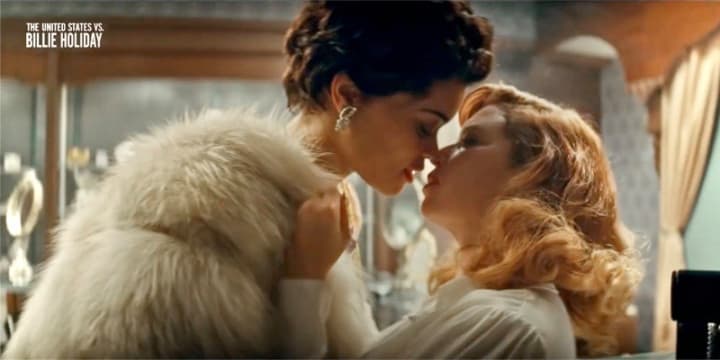
This isn’t a hit you over the head metaphor, it’s very much a well implied one. Lee Daniels is a masterful director who not only uses the story of Billie Holiday to reflect the way power perpetuates racism and the way racism was the horrific expression of power, he is still telling a clear and compelling story. Daniels has a lot of help in star Andra Day who powerfully captures the brilliant dichotomy of Billie Holiday, her intense desire to change the world and the toll that the burden of being a symbol and speaking out can have on someone.
Is Billie Holiday a martyr? Yes, very much so. Did she set out to be a martyr? No, most martyrs don’t seek the status, it is thrust upon them. Holliday was made a martyr by those who set out to silence her and in doing so, made her an icon beyond even her extraordinary talent. That Lee Daniels and screenwriter Susan Lori-Parks can tell this story so completely and with such complexity while still telling a compelling story that is not slowed by all this weight, is a feat of remarkable genius.
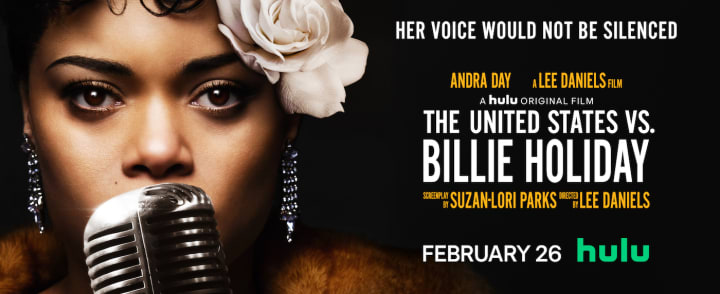
The United States vs Billie Holiday debuts on Hulu on February 26th.
About the Creator
Sean Patrick
Hello, my name is Sean Patrick He/Him, and I am a film critic and podcast host for the I Hate Critics Movie Review Podcast I am a voting member of the Critics Choice Association, the group behind the annual Critics Choice Awards.




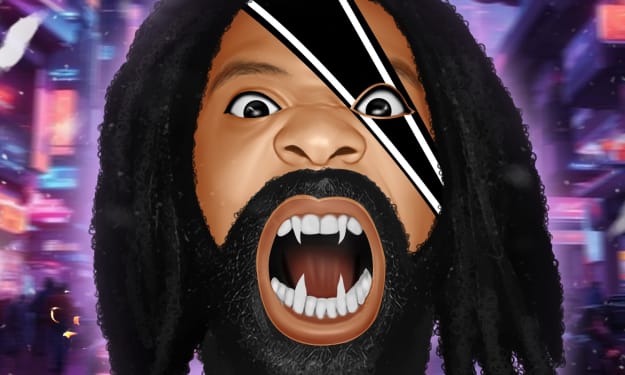

Comments
There are no comments for this story
Be the first to respond and start the conversation.